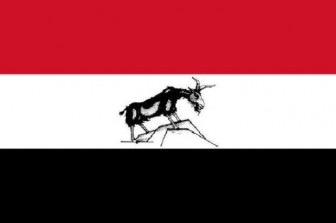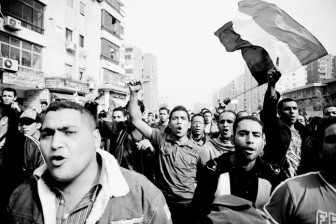By Christopher Carrico
Anthropology Programme
University of Guyana
This was originally going to be a History This Week article for Stabroek News when I was last scheduled to write for this column. Unfortunately, the analysis of Egypt which I had embarked on at the time turned out to be far more complicated than I had initially anticipated. I did not realize that my article was not deliverable until too late, and Stabroek News was left in the unfortunate situation of having no History This Week article to print for that week.
 However, I continued forward with the essay, and because of the timeliness of the material that I was writing about, I chose to publish this piece as a blog on As It Ought to Be (asitoughttobe.com) on 13 February, 2011. The blog post generated enough interest to be picked up by the Pan-African newsletter, Pambazuka (www.pambazuka.org), later that week. Pambazuka summarized my argument as ‘”Whether Egypt’s association with US-backed capitalism has been disrupted is a question that factory workers might yet decide,” writes Christopher Carrico.’
However, I continued forward with the essay, and because of the timeliness of the material that I was writing about, I chose to publish this piece as a blog on As It Ought to Be (asitoughttobe.com) on 13 February, 2011. The blog post generated enough interest to be picked up by the Pan-African newsletter, Pambazuka (www.pambazuka.org), later that week. Pambazuka summarized my argument as ‘”Whether Egypt’s association with US-backed capitalism has been disrupted is a question that factory workers might yet decide,” writes Christopher Carrico.’
I offer the article now for the space where it was originally intended. It is offered here in an edited version, but I have made no attempt to bring the article up-to-date on the state of the situation. I felt this was best because it was an essay written ‘in the heat of the moment’ on one Sunday in mid-February, when millions of Egyptians were ecstatically celebrating the removal from power of President Hosni Mubarak. To bring the article up-to-date, or to think about these events in the context of the current situation in Libya, would require completely different article than this one, which was meant to reflect on a very specific moment of time, and to share my reflections on this particular moment with a Guyanese audience via Stabroek News.
Hosni Mubarak, President of Egypt from 14 October, 1981 until February 11, 2011. Vice President Omar Suleiman announced Mubarak’s resignation to the Egyptian public and to the world, and state power was handed over to the Supreme Council of the Armed Forces, a body of the 18 highest-ranking officers who head the Egyptian military. As of Sunday, 13 February, the Egyptian military has dissolved parliament, suspended the Constitution, and imposed a military junta that has declared itself an interim government responsible for overseeing an ‘orderly transition’ to civilian rule in six months time.

What I have to say here is largely based on the reports of people like Hossam el-Hamalawy, Web 2.0 Activist, and member of the Egyptian Revolutionary Socialist party. In explaining the power that blogs, Facebook, and twitter have had in the popular movements in Egypt and elsewhere in the Arab world, el-Hamalawy notes that ‘Nearly 20 million out of 85 million Egyptians have access to the Internet, but its strength lies in the fact the traditional media have themselves begun to use it as a source of information’.
El-Hamalawy wrote in his blog 3arabawy (www.arabawy.org) that:
(Middle class) activists want us to trust Mubarak’s generals with the transition to democracy — the same junta that has provided the backbone of his dictatorship over the past 30 years. And while I believe the Supreme Council of the Armed Forces, who receive $1.3 billion (US Dollars) annually from the US, will eventually engineer the transition to a “civilian” government, I have no doubt it will be a government that will guarantee the continuation of a system that will never touch the army’s privileges, keep the armed forces as the institution that will have the final say in politics… (and) guarantee Egypt will continue to follow… US foreign policy…
Reform-oriented opposition leaders had been ‘urging Egyptians to suspend the protests and return to work, in the name of patriotism.’ Most of the crowd in Tahrir Square dissipated. Thousands of hold-outs, however, insisted that the setting up of military rule does not meet the main demands of their protest, and refused to leave the Square. The military indicated that it would use force if necessary to return Cairo to ‘normalcy.’ And the military police fairly rapidly removed the majority of the remaining protestors from Cairo’s streets.

But Hossam el-Hamalawy has made a critical observation that has largely been ignored in the Western media, ‘Whether Tahrir Square occupation continues or not, the real fight is now in the factories.’ As of the time of 7 February, el-Hamalawy reported in an interview with the French NPA (Nouveau Parti Anticapitaliste), that:
There are four hotbeds of economic struggle: a [steel] mill in Suez, a fertilizer factory in Suez, a textile factory near Mansoura in Daqahlia (the Mansoura-España garment factory in the Nile Delta region) on strike — they have fired their CEO and are self-managing their enterprise. There is also a print shop in southern Cairo called Dar al-Matabi: there, too, they fired their CEO and are self-managing the enterprise. But, while workers are participating in the demonstrations, they are not developing their own independent action as workers. We still have not seen workers independently organize themselves en masse. If that comes, all the equation of the struggle will change.
El-Hamalawy’s twitter feed, his blog, and like-minded others, such as the contributors to #egyworkers have been providing us with encouraging news such as:
The temporary workers in Helwan Steel Mills staged a sit in, south of Cairo.
Thousands of Public Transport workers demonstrated in el-Gabal el-Ahmar in Nasr City.
Railway technicians continued to bring the country’s trains to a halt.
Around 5,000 workers in El-Hawamdiya Sugar Factory went on strike.
Oil workers struck over economic demands, to impeach the Petroleum Minister, and halt subsidized gas exports to Israel.
And the list goes on and on. El-Hamalawy wrote:
Some have been surprised that the workers started striking. I really don’t know what to say. This is completely idiotic. The workers have been staging the longest and most sustained strike wave in Egypt’s history since 1946, triggered by the Mahalla strike in December 2006. It’s not the workers’ fault that you were not paying attention to their news. Every single day over the past three years there was a strike in some factory whether it’s in Cairo or the provinces.
As intoxicating and encouraging as all of this sounds, Reuters reported that ‘Egypt’s new military rulers will soon issue a warning… against anyone who creates “chaos and disorder”’.
The Military also banned meetings by labour unions or professional syndicates, effectively forbidding strikes, and told all Egyptians to get back to work after the unrest that toppled Hosni Mubarak.
El-Hamalawy reminds us that ‘when the army took over in 1952, (the) first thing they did was execut(e) two strike leaders at (the) Kafr el-Dawwar textile mill.’
It is exactly the emergence of even more repressive regimes, intent on a struggle to the death to put the breaks on a workers’ revolution in the Arab world, that Vijay Prashad warned of when he wrote that ‘if power is not seized, counter-revolution will rise.’
Prashad’s examples of the potential dangers in this case included the rise of Islamist parties. In Egypt, it is the Muslim Brotherhood that is best organized. But it seems fairly clear that in Egypt, as had always been the case in Pakistan, the real force to be reckoned with is the military, with the Muslim Brotherhood’s power mainly deriving from its mutually opportunistic relationship with the Egyptian Armed Forces.
One would expect that the prospect of a military dictatorship, with links to radical Islamists would be an alarming prospect to established powers in the United States and Israel. In all actuality, this is as nearly opposite the case as can be possible. It is the United States and Israel that have mainly been responsible for the also mutually opportunistic relationship between the established powers in Cairo, and the established powers in Washington and Jerusalem. Samir Amin describes the ambitions of the military and the Muslim Brotherhood as follows:
‘The military and the Muslim Brotherhood accept the hegemony of the United States in the region and the existing terms of peace with Israel. And their complacency continues to help permit Israel’s continued colonization of what remains of Palestine.
The reason for this is not some Zionist plot, or some secret conspiracy between Mubarak, Israel, and Washington. The reason for this is the open agreement between all parties on the existing parameters of the established order: the established order of capitalism under US hegemony. This includes the Muslim Brotherhood. Amin also writes that:
‘The key is that everyone accepts capitalism as it is. The Muslim Brotherhood has never considered changing things so seriously. Besides at major workers’ strikes of 2007-2008, their MPs voted with the government against the strikers. Faced with the struggles of peasants evicted from their land by large landowners, the Muslim Brotherhood took part against the peasant movement. For them the private property, free enterprise and profit are sacred.’
What would really be a threat to the Egyptian military, to United States foreign policy interests, to the Israeli state, and to established capitalist powers in the region, would not be the emergence of a new Islamic extremist party in alliance with the Egyptian military: after all that has simply been the status quo of the Mubarak years. What would really be a threat to these established powers is if the idea of socialism caught on in the Arab world, and beyond. And if the popular classes of nations around the world were inspired by Egypt to take concrete actions that challenge entrenched power in their own nation-states.




